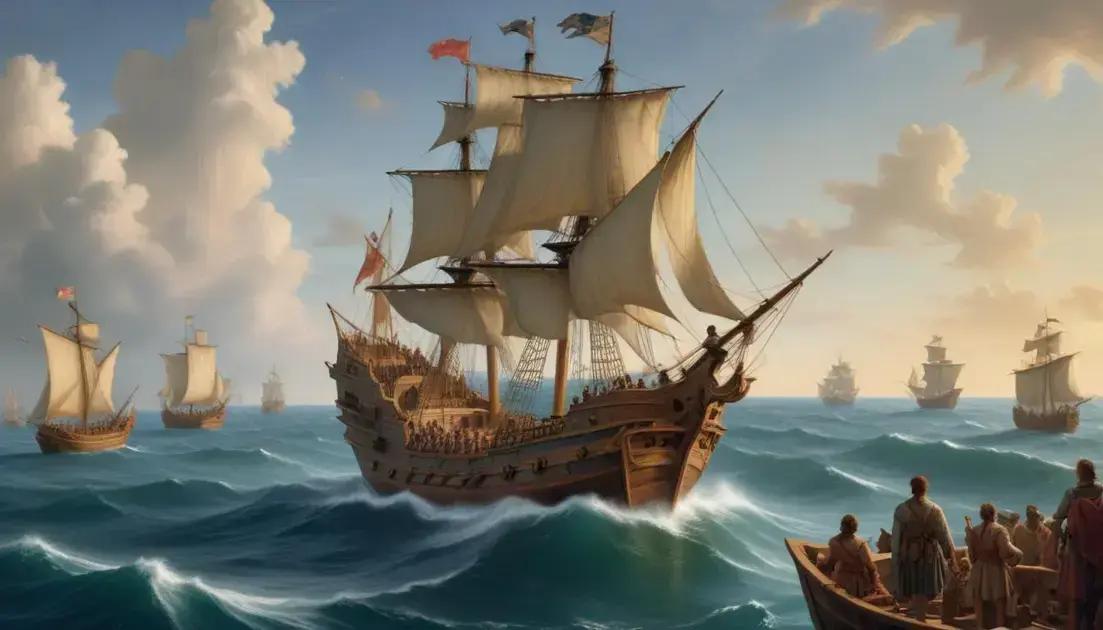
Christopher Columbus and the Discovery of America in 1492
Christopher Columbus’s 1492 voyage significantly impacted history by opening new trade routes and initiating cultural exchanges between Europe and the Americas. While it led to the exchange of goods and ideas, it also resulted in conflicts and the suffering of indigenous peoples. Columbus’s legacy remains complex, inspiring both exploration and reflection on the consequences of colonization, making it essential to understand how his journey shaped the modern world.
Columbus’ quest in 1492 changed the world forever. Curious about how this journey influenced cultures and societies? Let’s dive into history!
Introduction to Columbus’ voyage
In 1492, Christopher Columbus embarked on a daring journey across the Atlantic Ocean. His goal? To find a shorter route to Asia and its riches. Instead, he stumbled upon the Americas, which were unknown to Europeans at the time.
Columbus set sail from Spain with three ships: the Niña, the Pinta, and the Santa María. The journey was tough and full of challenges, but Columbus and his crew pressed on. They faced storms and uncertainties but were driven by dreams of discovery.
After weeks at sea, land finally appeared on October 12. Columbus and his crew would soon experience a world very different from their own. They encountered native peoples and lush landscapes, which opened a new chapter in history.
This event marked the beginning of widespread exploration. Columbus’s findings led to further voyages and the eventual colonization of the Americas. His journey sparked great interest and ambition in Europe to explore the new lands.
Impact on Europe and the Americas
The voyage of Christopher Columbus had a huge impact on both Europe and the Americas. His discovery opened the doors for exploration and colonization of new lands. For Europe, this meant new trade routes and resources. The wealth from the Americas helped boost economies back home.
Columbus’s journey also led to the exchange of goods, ideas, and cultures. This exchange is known as the Columbian Exchange. It included crops like potatoes, tomatoes, and corn moving to Europe. In return, Europeans brought horses, cattle, and diseases to the Americas.
However, not all impacts were positive. The arrival of Europeans brought conflict and suffering to native populations. Many indigenous people faced violence, displacement, and disease. Entire cultures were disrupted as colonizers claimed land and resources.
In Europe, Columbus’s news excited many explorers. It fueled a race to claim lands and establish colonies. This period saw an increase in voyages across the Atlantic, shaping global trade and power dynamics.
Cultural exchanges and conflicts
The arrival of Christopher Columbus in the Americas sparked many cultural exchanges. These exchanges included sharing foods, customs, and languages between Europeans and Native Americans. For example, crops like maize and potatoes became staples in Europe.
However, these exchanges weren’t always positive. Along with new foods, Europeans brought diseases that devastated native populations. Many Native Americans had no immunity to these diseases, leading to tragic consequences.
As cultures met, conflicts arose. Europeans often wanted to claim land for themselves. This led to tensions and violence with indigenous groups. Native Americans fought to protect their homes and ways of life.
While some interactions were friendly, many were marked by misunderstanding and hostility. European settlers tried to impose their beliefs and systems on native people. This clash of cultures created lasting impacts on both sides.
The legacy of these exchanges is complex. They shaped the Americas into what they are today but also left scars of conflict that are remembered. Cultural exchanges continue to influence our world.
Legacy of Columbus’ discovery
The legacy of Christopher Columbus is both rich and controversial. His voyage in 1492 opened up the New World to European exploration. This led to major changes in trade, culture, and even politics across the globe.
Columbus’s discovery changed the course of history. It began a period of exploration that shaped modern countries. New routes created wealth for European nations, while plant and animal exchanges transformed diets worldwide.
However, Columbus’s impact wasn’t all positive. His arrival marked the start of colonization. Native populations faced violence, disease, and displacement. Many cultures were disrupted or destroyed in the process.
The debate about Columbus continues today. Some view him as a brave explorer, while others see him as a figure of oppression. Schools and communities reflect on his legacy differently, highlighting a complex history.
Columbus’s journeys led to a world more interconnected than ever. This connection brought together different cultures, leading to a shared history that we still navigate today.
Conclusion
In conclusion, the voyage of Christopher Columbus had lasting effects on both Europe and the Americas. His discovery opened the door to new trade routes and cultural exchanges. However, it also sparked conflicts and suffering among indigenous peoples.
Understanding Columbus’s legacy is important. It shows us a complex blend of exploration, opportunities, and harsh realities. By reflecting on this history, we can learn valuable lessons about the impacts of discovery and colonization.
As we explore the world today, it’s crucial to remember the past. This knowledge can help us appreciate different cultures and promote kindness and understanding. The journey of Columbus reminds us that history shapes our present and future.


